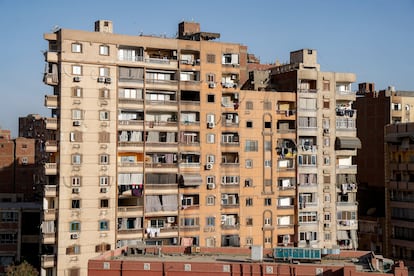One-dollar rents have their days numbered in Egypt
The Supreme Constitutional Court is forcing the government to amend a law that has kept prices frozen for decades

In recent years, entering the rental market in Egypt has become a nightmare. Since the beginning of 2021, the local currency has fallen by 70% against the dollar, while the inflation rate has reached historic highs of 40%. The market has become an incoherent and ever-changing jungle, where no one quite knows how to set prices, or for how long.
As if the situation weren’t unstable enough, the Supreme Constitutional Court dropped another bombshell in November of 2024, by striking down the core of a law that kept old rents frozen for decades, while allowing leases to be inherited. Although the legal battle dates back 37 years, the judges have only given the Parliament of Egypt until the end of June to amend it. Otherwise, those rent caps will be removed.
Egyptian rental contracts were deregulated by a 1996 law that created a dual system between contracts signed prior to that year and those signed since then, the latter of which are subject to market prices. According to the latest census, conducted in 2017, only 14% of families in the country live in rented accommodation. At face value, renting doesn’t seem like a very popular option. The problem — as is often the case in Egypt — is the absolute numbers hidden behind the percentages. In this case, 3.3 million families — including 1.6 million with old contracts — and the plurality (1.1 million of them) are concentrated in the Cairo metropolitan area, where this type of contract covers 25% of all households.
One of the main complaints from landlords is that, over time, the price difference between old and new rentals has become absurd. This is especially the case in the capital, where some 600,000 households are paying rents of less than 50 Egyptian pounds a month (about $1) and, in the most expensive cases, barely 900 pounds ($18). Although there’s a wide variation, the price of new rentals can easily be up to 100 times higher. This situation has left many buildings in a deplorable condition, because landlords are unwilling — or unable — to maintain them properly. It has also led some landlords to choose to leave their apartments empty for decades. And, in the most extreme cases, they have resorted to vandalism, so as to empty apartments or vacate buildings and then sell the land.
Proponents of this model point out that it guarantees the stability and security of tenants and the community networks in their neighborhoods. They clarify that, for years, many renters have borne the maintenance costs of the apartments and buildings where they live, have invested in fixing them up, or have made extra payments to landlords to obtain or maintain their contracts.
A thorny issue
On the other hand, there’s a more thorny issue, especially for the government: many of these tenants are low-income families who cannot afford the market rent, nor can they afford to buy. If their contracts are abruptly liberalized, the result could be hundreds of thousands of evictions at once. The minimum wage in Egypt’s private sector — which, in many cases, isn’t even enforced — is only around $143 per month. This has led many to wonder why, for decades, the authorities’ policies haven’t been able to ensure that the majority of Egyptians can at least afford the cost of housing.
Faced with this situation, the staunchly pro-market government recently submitted a bill to parliament that would abruptly increase the price of old rents by 20%, with a minimum base of 1,000 pounds ($20) in the cities and half of that in the villages. These rents would then increase by 15% annually for five years. And, once this period is over, the bill stipulates that these contracts would become subject to market rates, like all the rest.
The legislation includes an article to ensure that those facing eviction receive priority access to social housing. However, these units may be located in areas that are very far from where the tenants have always lived.
Sign up for our weekly newsletter to get more English-language news coverage from EL PAÍS USA Edition
Tu suscripción se está usando en otro dispositivo
¿Quieres añadir otro usuario a tu suscripción?
Si continúas leyendo en este dispositivo, no se podrá leer en el otro.
FlechaTu suscripción se está usando en otro dispositivo y solo puedes acceder a EL PAÍS desde un dispositivo a la vez.
Si quieres compartir tu cuenta, cambia tu suscripción a la modalidad Premium, así podrás añadir otro usuario. Cada uno accederá con su propia cuenta de email, lo que os permitirá personalizar vuestra experiencia en EL PAÍS.
¿Tienes una suscripción de empresa? Accede aquí para contratar más cuentas.
En el caso de no saber quién está usando tu cuenta, te recomendamos cambiar tu contraseña aquí.
Si decides continuar compartiendo tu cuenta, este mensaje se mostrará en tu dispositivo y en el de la otra persona que está usando tu cuenta de forma indefinida, afectando a tu experiencia de lectura. Puedes consultar aquí los términos y condiciones de la suscripción digital.









































